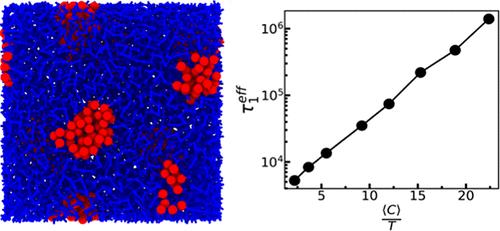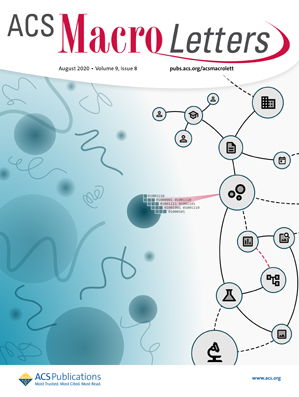微相分离控制结合体的动力学
IF 5.2
Q1 POLYMER SCIENCE
引用次数: 0
摘要
Vitrimers是一类以动态共价网络为特征的聚合物,其中特定的单体单元──贴纸──形成可逆交联,使网络重排而不丧失整体连通性。传统观点认为,黏贴动力学控制着链的松弛行为,从而控制着缔合玻璃体的机械性能,其中交联黏贴对的数量随时间精确地保持不变。相反,我们在这里展示了粘接基团和非粘接链单体之间的化学差异可以导致它们的微相分离。在这些条件下,贴纸从一个微相到相邻微相的缓慢交换控制了弛豫行为。因此,控制黏贴聚集是调整这些聚合物性能的关键,与循环聚合物经济直接相关。本文章由计算机程序翻译,如有差异,请以英文原文为准。

Microphase Separation Controls the Dynamics of Associative Vitrimers
Vitrimers are a class of polymers characterized by dynamic covalent networks, where specific monomer units─stickers─form reversible cross-links that enable network rearrangement without loss of overall connectivity. The conventional wisdom is that the sticker dynamics control chain relaxation behavior and hence the mechanical properties of associative vitrimers where the number of cross-linked sticker pairs is precisely constant over time. Instead, here we show that the chemical differences between sticker groups and nonsticky chain monomers can cause them to microphase separate. Under these conditions, the slow exchange of a sticker from one microphase to an adjacent one controls the relaxation behavior. Controlling sticker aggregation is thus a key to tailoring the properties of these polymers, with immediate relevance to a circular polymer economy.
求助全文
通过发布文献求助,成功后即可免费获取论文全文。
去求助
来源期刊
CiteScore
10.40
自引率
3.40%
发文量
209
审稿时长
1 months
期刊介绍:
ACS Macro Letters publishes research in all areas of contemporary soft matter science in which macromolecules play a key role, including nanotechnology, self-assembly, supramolecular chemistry, biomaterials, energy generation and storage, and renewable/sustainable materials. Submissions to ACS Macro Letters should justify clearly the rapid disclosure of the key elements of the study. The scope of the journal includes high-impact research of broad interest in all areas of polymer science and engineering, including cross-disciplinary research that interfaces with polymer science.
With the launch of ACS Macro Letters, all Communications that were formerly published in Macromolecules and Biomacromolecules will be published as Letters in ACS Macro Letters.

 求助内容:
求助内容: 应助结果提醒方式:
应助结果提醒方式:


